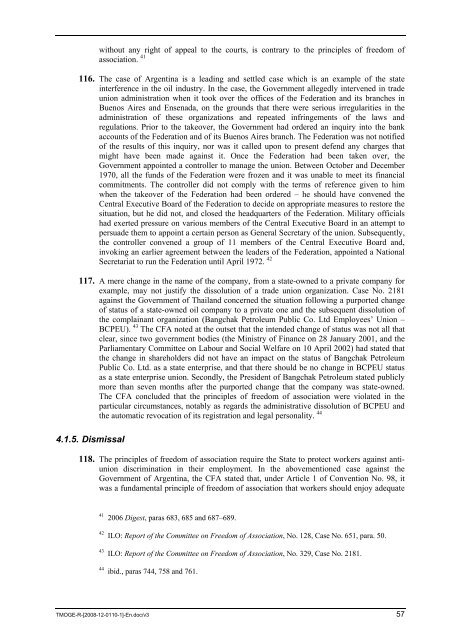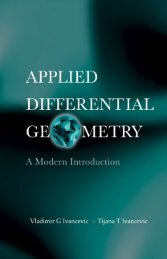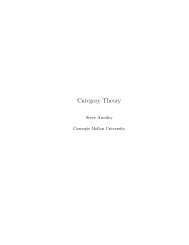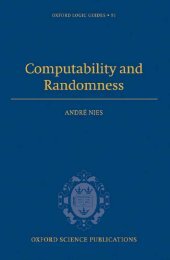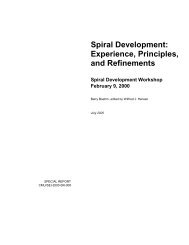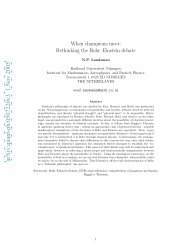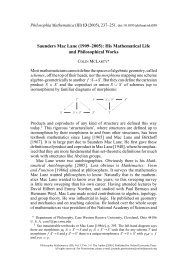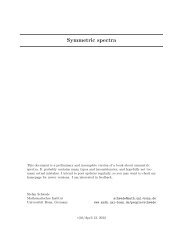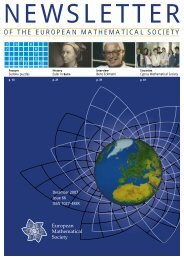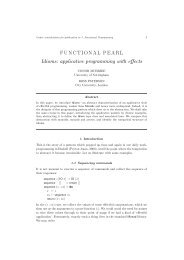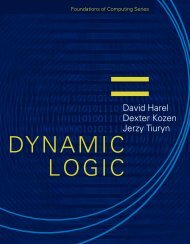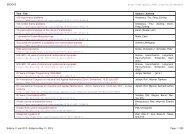wcms_161662
wcms_161662
wcms_161662
You also want an ePaper? Increase the reach of your titles
YUMPU automatically turns print PDFs into web optimized ePapers that Google loves.
without any right of appeal to the courts, is contrary to the principles of freedom of<br />
association. 41<br />
116. The case of Argentina is a leading and settled case which is an example of the state<br />
interference in the oil industry. In the case, the Government allegedly intervened in trade<br />
union administration when it took over the offices of the Federation and its branches in<br />
Buenos Aires and Ensenada, on the grounds that there were serious irregularities in the<br />
administration of these organizations and repeated infringements of the laws and<br />
regulations. Prior to the takeover, the Government had ordered an inquiry into the bank<br />
accounts of the Federation and of its Buenos Aires branch. The Federation was not notified<br />
of the results of this inquiry, nor was it called upon to present defend any charges that<br />
might have been made against it. Once the Federation had been taken over, the<br />
Government appointed a controller to manage the union. Between October and December<br />
1970, all the funds of the Federation were frozen and it was unable to meet its financial<br />
commitments. The controller did not comply with the terms of reference given to him<br />
when the takeover of the Federation had been ordered – he should have convened the<br />
Central Executive Board of the Federation to decide on appropriate measures to restore the<br />
situation, but he did not, and closed the headquarters of the Federation. Military officials<br />
had exerted pressure on various members of the Central Executive Board in an attempt to<br />
persuade them to appoint a certain person as General Secretary of the union. Subsequently,<br />
the controller convened a group of 11 members of the Central Executive Board and,<br />
invoking an earlier agreement between the leaders of the Federation, appointed a National<br />
Secretariat to run the Federation until April 1972. 42<br />
117. A mere change in the name of the company, from a state-owned to a private company for<br />
example, may not justify the dissolution of a trade union organization. Case No. 2181<br />
against the Government of Thailand concerned the situation following a purported change<br />
of status of a state-owned oil company to a private one and the subsequent dissolution of<br />
the complainant organization (Bangchak Petroleum Public Co. Ltd Employees’ Union –<br />
BCPEU). 43 The CFA noted at the outset that the intended change of status was not all that<br />
clear, since two government bodies (the Ministry of Finance on 28 January 2001, and the<br />
Parliamentary Committee on Labour and Social Welfare on 10 April 2002) had stated that<br />
the change in shareholders did not have an impact on the status of Bangchak Petroleum<br />
Public Co. Ltd. as a state enterprise, and that there should be no change in BCPEU status<br />
as a state enterprise union. Secondly, the President of Bangchak Petroleum stated publicly<br />
more than seven months after the purported change that the company was state-owned.<br />
The CFA concluded that the principles of freedom of association were violated in the<br />
particular circumstances, notably as regards the administrative dissolution of BCPEU and<br />
the automatic revocation of its registration and legal personality. 44<br />
4.1.5. Dismissal<br />
118. The principles of freedom of association require the State to protect workers against antiunion<br />
discrimination in their employment. In the abovementioned case against the<br />
Government of Argentina, the CFA stated that, under Article 1 of Convention No. 98, it<br />
was a fundamental principle of freedom of association that workers should enjoy adequate<br />
41 2006 Digest, paras 683, 685 and 687–689.<br />
42 ILO: Report of the Committee on Freedom of Association, No. 128, Case No. 651, para. 50.<br />
43 ILO: Report of the Committee on Freedom of Association, No. 329, Case No. 2181.<br />
44 ibid., paras 744, 758 and 761.<br />
TMOGE-R-[2008-12-0110-1]-En.doc/v3 57


